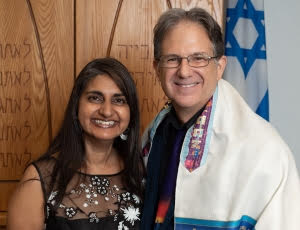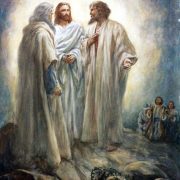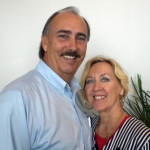The closing service on Yom Kippur is called Ne’ilah. The Ne’ilah prayer is …
O keep open for us Your gate of mercy, at the time of the closing of the gate. Now that the day is waning. The day is passing; the sun is setting; O let us enter Your gate at last. O God, we beseech You, forgive, pardon, take pity; grant us atonement; subdue our sin and iniquity.
http://www.mjcnj.com/wp-content/uploads/2011/04/MJC_Contemporary_Machzor_20111.pdf
Neilah (means closing) and is the final service of Yom Kippur (Day of Atonement). This is the most serious appointment God gave His people Israel (Leviticus 23). This is a day devoted to seeking atonement or forgiveness of sins.
In ancient Israel when the day would end at sunset, the gates of Jerusalem would close. This last service of Yom Kippur is taking place during the last minutes of the day. The closing of the Jerusalem gates painted an important picture for the people of Israel. As the people thought about the closing of the gates of the city and that they day was about to end, they would realize that their opportunity to convince God to forgive them of their sins was also about to end.
What purpose do gates serve?
A gate is a point of entry. Gates prevent or allow the entry or exit of individuals.
(https://www.morfix.co.il/נעילה) Ne’ilah: closing, locking
The gates are not only closing, but they will be locked. This means people cannot enter locked gates unless they have the key, or someone else unlocks the gate for them.
What do we learn about gates in the Bible?
(Deuteronomy 16:18 JPS) Judges and officers shalt thou make thee in all thy gates, which the LORD thy God gives thee, tribe by tribe; and they shall judge the people with righteous judgment.
(Deuteronomy 21:18-19 JPS) If a man have a stubborn and rebellious son, that will not hearken to the voice of his father, or the voice of his mother, and though they chasten him, will not hearken unto them; then shall his father and his mother lay hold on him, and bring him out unto the elders of his city, and unto the gate of his place;
(cf. Deuteronomy 25:7, Proverbs 31:23) Elders sit at the gates.
Elders, judges and officers’ rule and judge from the gates of the city. In some way, when the time comes for people to meet God, they will go to the Gates of Heaven to be informed of God’s judgement and learn whether or not they are welcome to enter the gates.
In Jeremiah 17:19-27 we read that Prophets went to the city gates and declared judgement for disobeying God’s Word. Judgment happens at gates. At gates people find out whether their sins are forgiven or not. And if they’re not forgiven, people receive their judgement for their sins or disobedience.
Now let’s see what Yeshua says about the gates of heaven.
(Matthew 7:13-14 TLB) “Heaven can be entered only through the narrow gate! The highway to hell is broad, and its gate is wide enough for all the multitudes who choose its easy way. But the Gateway to Life is small, and the road is narrow, and only a few ever find it.”
Yeshua told us that there are two gates; one leads to life and one leads to destruction. The gate that leads to death is wide so it is easy to follow and many people enter it. On the other hand, the gate to life is narrow and hard to follow so only a few people enter the gate of life.
Narrow
(Thesaurus): cramped, limiting and restrictive
The road and gate to heaven is narrow. They are cramped, limiting and restrictive. People want to be free to do anything they want, and to go anywhere they want, but this is not possible if we want to live with God forever. In Leviticus 23 we read that on Yom Kippur we must deny ourselves or live a life with limits and restrictions if we want to please God.
(Galatians 5:13 NLT) For you have been called to live in freedom, my brothers and sisters. But don’t use your freedom to satisfy your sinful nature. Instead, use your freedom to serve one another in love.
(Galatians 5:13 CEV) My friends, you were chosen to be free. So don’t use your freedom as an excuse to do anything you want. Use it as an opportunity to serve each other with love.
Our freedom does not allow us to do things which are identified as sin in God’s Instructions (the Bible). We are free to live for God and serve Him according to His Instructions given in the Bible. We may be free, but we have to deny ourselves of things if we want to walk through the narrow and restrictive gates of heaven.
(Exodus 7:16) “Let My people go, so that they may serve Me in the wilderness.”
God gave Moses a message for Pharoah. People often quote the first half of this message which was to inform Pharoah that God wanted His people to be free. But that is not all God said to Pharoah. He also told Pharoah the reason for the freedom. The people of Israel were not being freed from their slavery so they could be their own master and decide what they wanted to do. They were being set free to serve God. I think God has a different definition of freedom than most people.
(Proverbs 14:12 TLB) Before every man there lies a wide and pleasant road that seems right but ends in death.
(Proverbs 14:12 MSG) There’s a way of life that looks harmless enough; look again – it leads straight to hell. Sure, those people appear to be having a good time, but all that laughter will end in heartbreak.
The wide-open road is so appealing to so many people. Yet the Bible informs us that looks are deceiving. Our eyes are fooled as the wide-open road really leads to death. The road (and all that is happening on the road) seems so harmless. People are smiling and enjoying themselves. Yet, the smiles will soon disappear. People have been deceived and fooled by Satan, and the road will lead them to Satan (who will be waiting for them in hell).
Yeshua is the narrow gate
(John 10:7-10 NLT) “I tell you the truth, I am the gate for the sheep. All who came before Me were thieves and robbers. But the true sheep did not listen to them. Yes, I am the gate. Those who come in through Me will be saved. … My purpose is to give them a rich and satisfying life.
Yeshua is the gate. He invites and allows people to enter a land filled with good pastures. Yeshua must allow us to enter His presence or heaven.
(John 10:1 NLT) “I tell you the truth, anyone who sneaks over the wall of a sheepfold, rather than going through the gate, must surely be a thief and a robber!
When we want to enter our home, we use our key to unlock the door. This is the proper way to enter our home, or any building. When you see someone put a key in a door you probably don’t think too much about it. But, if you see someone climbing over a fence or into a window of a home, what would you think? The first thought that should come to your mind is, “Is this person trying to break into the building or home?”
Yeshua is the gate; the legal and proper way to enter property or a home. If people try to enter the Kingdom of God any other way besides going through Yeshua: the gate, they are trying to enter a place they have no right to enter. If you want to experience a rich and satisfying life here on earth, and forever with God, Yeshua is the only gate.
(Revelation 21:25-27 NASB) its gates will never be closed; and they will bring the glory and the honor of the nations into it; and nothing unclean, and no one who practices abomination and lying, shall ever come into it, but only those whose names are written in the Lamb’s book of life.
There will never be any sin in the New Jerusalem so there won’t be anything that could keep people separated from God or forbid them from entering His presence. Once judgement has taken place and we’ve been admitted or thrown into our eternal home, no one will be left wandering about trying to illegally enter heaven so the gates of heaven will never be closed (or locked).
I read in an article that there is a paradox presented in the Neilah service when it mentions that the gates will be closing. Jewish tradition has us rushing to repent before the gates close, yet there’s also the belief that God always welcomes the sinner and is always eager for us to turn in repentance.
What’s the rush to enter the gates?
There is never a time when we are not welcome to return. And if God is always eager to receive the sinner in repentance, then what’s the rush? If God does not close His gates, and prevent people from entering His presence, why is there a service telling people the gates are about to close so they better pray with all they’ve got?
If we live only with the assumption that repentance always is available, then we would never be motivated to actually change at a particular instance. Just as knowledge of our certain mortality infuses our life with a need to seize the day, so does the push of Yom Kippur as a time particularly favorable to teshuvah (repentance) inspire us to more focused contemplation than a more open-ended process would. [www.jewishjournal.com/culture/religion/yom_kippur/225057/neilah/]
If all we think about is that the Gates to Heaven are always open, people have no reason or need to enter now. People can choose to continue living a life without God, assuming they’ve got lots of time before they need to change and put God first. For this reason, the Ne’ilah service is necessary.
Once the service ends, and people exit the doors they’ll be confronted with many necessary needs of life. God may still be on their minds, but He will no longer dominate their thoughts like He did during the service. The things we think about and do outside the gates of Temple are not sinful, but once the service ends, God will not have the same place in our minds as He had during the service.
(James 4:14 NLT) How do you know what your life will be like tomorrow? Your life is like the morning fog – it’s here a little while, then it’s gone.
You know for sure that the morning fog will disappear, but we do not know when. Time is constantly moving forward, and we have no clue when our life will end. We do not know exactly when we will die, but we do know that we are closer to the time of our death then we are to the time of our birth.
(Everyman’s Talmud, p. 110) However true it be that repentance is possible up to the moment of death, it is considered unwise to postpone it. ‘R. Eliezer said, “Repent one day before your death.” His disciples asked him, “Does then, anybody know on which day he will die?” He replied to them, “How much more reason is there for him to repent today, lest he be dead tomorrow; and as a consequence all his days will be spent in repentance”’ (Shab. 153a).
What great insight! Right up to the second, we breathe our last breath, we have an opportunity to repent. But the reality is that we do not know the exact time we will die. Therefore, we cannot postpone repenting of our sins or turning back to God. We need to do it now!
(Neilah Poem) Faster-faster I hear the Chorus of the Hosts on High. Not words but God’s soft unspoken plea is heard- “Keep open your gate! Keep open your gate!” The stars wink down above me. … The Shofar calls an end – a Neilah. Yet as I leave His sanctuary His silent Shofar calls. “Keep open your gates for Mine are never closed.”God’s gates will be open tomorrow, a year from now, etc. But right now, God has your attention. Right now, your mind is focused on God and the gates of heaven. Once you stop reading this article, things will change. God wants to know if your gates are open, and if you will invite Him to enter and be Lord of your life. If you invite God to enter your gates, He will invite you to enter His gates. Would you like to enter His gates now?
Ron Goldberg is a Jew who belongs to Jesus. He regularly speaks to all denominations and faiths about his spiritual journey. Ron was raised as a traditional Jew and was sent to deprogramming by his parents and rabbi in hopes of getting him to reject Yeshua (Jesus). He shares how he met the Jewish Jesus and helps other people meet the Jewish Jesus. Have you met the Jewish Jesus?









Leave a Reply
Want to join the discussion?Feel free to contribute!